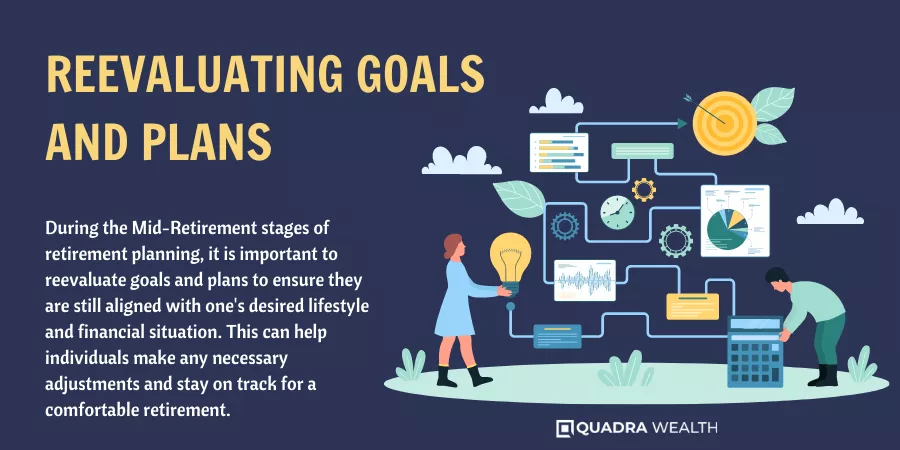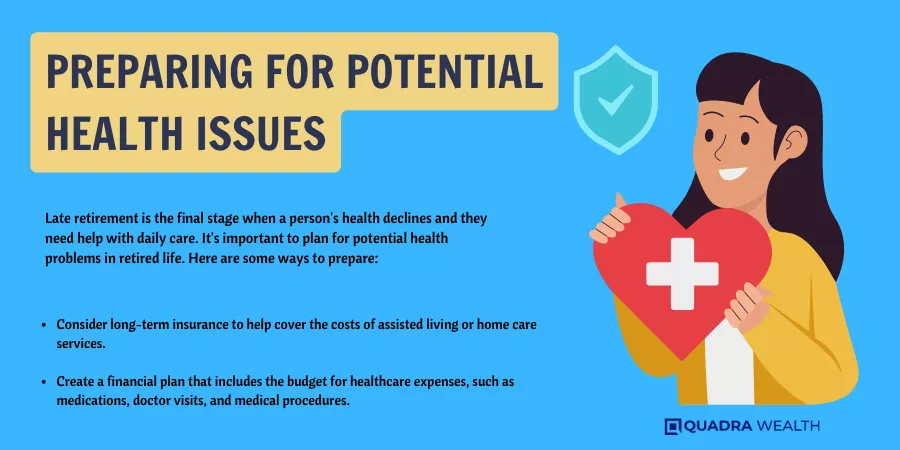In This Article
The Essential Phases of Retirement Planning: A Comprehensive Guide

Are you wondering how to plan effectively for your golden years? Retirement, contrary to popular belief, is not a one-size-fits-all life stage; it’s actually comprised of multiple phases each presenting unique opportunities and challenges.
This blog post will give you an idea about the various stages of retirement planning from early retirement to late retirement so that you can start saving for retirement earlier and achieve financial stability to cope with lifestyle changes.
Retirement can span decades, and it changes as you age. Everyone’s retirement will look different, but most people have four phases of retirement. Understanding and properly planning for these stages is key to accomplishing a dream retirement.
Let’s embark on this journey and ensure that every phase of your retirement unfolds just as you envision.
Key takeaways
●Retirement planning consists of various phases, each with its own unique opportunities and challenges.
●The phase before retirement focuses on setting financial goals and preparing for income needs in retirement.
●Early retirement is a great time to enjoy newfound freedom while still maintaining responsible wealth management.
●Mid - retirement requires reevaluating goals and plans, as well as coping with changes in health and personal circumstances.
●Late retirement involves preparing for potential health issues and estate planning for the distribution of assets after passing away.
Understanding the Phases of Retirement Planning
Retirement planning goes beyond money. It’s about how you want to spend your days too. Financial planners and other advisors sometimes divide retirement into different stages. The pre-retirement phase is about setting financial goals and planning needs.
Next, there’s the early retirement phase: here, folks get to enjoy their freedom but may also face big changes in lifestyle.
Next comes mid-retirement where plans may have to change. Coping with shifts is key during this time as well. Late retirement brings its own challenges, like health problems or estate planning matters.
These steps help you make a plan that suits your life and needs best for each stage of your retirement life.
Phase 1: Pre-Retirement
During this first phase, individuals should focus on setting their financial goals and preparing for their revenue needs in retirement.
The pre-retirement phase is a critical time for setting yourself up for success in retirement, so you don’t “wing it” and fall into a typical retirement rut, where your lack of a plan, structure, and retirement routine leaves you aimless.
Setting Financial Goals
Let’s learn how to set financial goals for retirement savings and maximize your retirement savings over the long run. It begins around fifty years old, right in the Pre-Retirement time. Here are some idea you can take:
- Understand how much funds you need: Think about the life you want when retire. This helps in knowing how much savings is enough.
- Learn about Social Security and Medicare benefits: These will be part of your earnings after retiring.
- Make use of long-term care insurance: It keeps health costs low when you retire.
- Pick a good age to stop working: The right duration to retire varies for different people.
- Work out future expenses: Knowing what your futurity bills might look like is a smart step ahead.
- Figure out income needs for retirement: Plan so that your funds last throughout your later years.
- Save as much as you can now: The more money stashed away during the Pre-Retirement time, the more secure your retirement will be.

Planning for Income Needs
Plan for your money needs in fulfilling retirement. Talk to a financial planner early. They can tell if your retirement savings is on track. Learn about Social Security and Medicare benefits too.
Make small changes now that grow big later with compound interest. Saving just a little bit each week can add up over time! Also, look at long-term care insurance during this phase of preparing for earning needs.
Try to put as much money as you can into your employer’s retirement plan, especially if they match what you save. If self-employed or without a work-based option, consider individual retirement accounts (IRAs).
Every little bit helps reach your future goals!
Phase 2: Early Retirement
During this phase (also called as honeymoon phase), After years of working hard and diligently adding to your retirement savings, it’s the great time to start enjoying everything you’ve been putting off for decades, individuals can enjoy the freedom that comes with retirement and adjust to lifestyle changes.
Enjoying Freedom
During the Early Retirement phase, individuals have the opportunity to enjoy their newfound freedom. They can explore on leisure activities for new hobbies, travel, or even start a second career or business if they desire.
This is a time to focus on personal fulfillment and pursue activities that bring joy and satisfaction. However, it’s important to remember that careful financial planning is still necessary during this phase to ensure long-term security.
By balancing enjoyment with responsible money management, retirees can make the most of their freedom while also safeguarding their future.

Adjusting to Lifestyle Changes
As you transition into early retirement, it’s important to adjust to the major life change that comes with it. This disenchantment phase can bring both excitement and challenges as you adapt to a new life routine and find ways to fill your time.
One key aspect is managing your finances effectively since you may no longer have a steady paycheck. It’s crucial to create a new budget and prioritize your spending based on what matters most to you.
Additionally, consider exploring new hobbies or activities that bring you joy and fulfillment during this stage of life. By embracing change and staying flexible, you can navigate these adjustments smoothly while enjoying the freedom that retirement brings.
Remember: Adjusting to lifestyle changes in retirement requires careful planning, especially when it comes to managing your finances effectively without a regular profit source.
Take the time to evaluate your priorities and find meaningful activities or hobbies that bring happiness and fulfillment during this chapter of life.
Phase 3: Mid-Retirement
After the initial excitement, individuals need to reevaluate their goals and plans for the remainder of their retirement years. They may experience various changes in their health or personal circumstances, requiring adjustments to their financial strategies and lifestyles.
This is a crucial stage where many retirees must cope with new challenges while finding a renewed sense of purpose and routines.
Reevaluating Goals and Plans
During the Mid-Retirement stages of retirement planning, it is important to reevaluate goals and plans to ensure they are still aligned with one’s desired lifestyle and financial situation.
This can help individuals make any necessary adjustments and stay on track for a comfortable retirement. Reevaluating goals and plans during this phase can also address potential changes in health, family dynamics, and personal preferences.
It is crucial to consider factors such as housing choices, long-term care needs, estate planning, and tax strategies. Consulting with expert financial advisors can provide valuable guidance in making informed decisions regarding these aspects of retirement planning.

Coping with Changes
During the mid-retirement phase, it is important for retirees to be prepared for various changes that may arise. This period can bring about more health-related expenses and a potential need for support from family or others.
Additionally, estate plans become crucial during this time as family dynamics might have changed. Retirees should also consider where they want to live as they get older and explore different options such as downsizing or moving to a retirement community.
It is essential to plan ahead and be proactive in preparing for the later phases of retirement, including late retirement since longer lifespans can result in extended long-term care needs.

Phase 4: Late Retirement
Preparing for Potential Health Problems and Estate Plans.
Preparing for Potential Health Issues
Late retirement is the final stage when a person’s health declines and they need help with daily care. It’s important to plan for potential health problems in retired life. Here are some ways to prepare:
- Consider long-term insurance to help cover the costs of assisted living or home care services.
- Create a financial plan that includes the budget for healthcare expenses, such as medications, doctor visits, and medical procedures.
- Discuss your healthcare wishes with your loved ones and create legal documents like a power of attorney and healthcare directive.
- Research different options for long-term care services, such as nursing homes or in-home caregivers, and understand the associated costs.
- Review your estate plan and ensure it reflects your wishes for healthcare decisions, beneficiaries, and asset distribution.
- Stay proactive about your health by maintaining a healthy lifestyle, scheduling regular check-ups, and following medical advice.

Estate Planning
It is a crucial aspect of late retirement. It involves making sure that your assets and belongings are managed and distributed according to your wishes after you pass away.
This includes creating legal documents like wills, trusts, and power of attorney. It’s also important to consider healthcare options such as long-term care insurance to cover assisted living or nursing home costs.
And remember, it’s essential to regularly update your estate plans as circumstances change. So take the time during late retirement to make sure everything is in order for your loved ones when the time comes.
How to Plan for Each Phase Effectively
Planning for each phase of retirement effectively is crucial to ensure financial stability phase and emotional well-being. Here are some steps to consider:
- Phase 1: Pre-Retirement
- Set clear financial goals that align with your desired retirement lifestyle.
- Calculate your expected retirement income needs and create a budget.
- Phase 2: Early Retirement
- Enjoy the freedom of retirement by engaging in activities you love, such as traveling or pursuing hobbies.
- Adjust to the changes in your lifestyle and start thinking, then find new things and establish some healthy habits to stay active and fulfilled.
- Phase 3: Mid-Retirement
- Regularly reevaluate your goals and plans, considering any changes in health or circumstances.
- Develop strategies to cope with any challenges or a transition that may arise during this phase.
- Phase 4: Late Retirement
- Prepare for potential health problems by considering long-term care options and insurance coverage.
- Create an estate plan to protect your assets and ensure they’re distributed according to your wishes.
Hence Reaching this stage will enable you to fully enjoy all the benefits the golden years have to offer.

- Security
- Early Prep
- Informed Choices
- Stress Relief
- Custom Lifestyle
- Healthcare Ready
- Benefit Optimization
- Financial Risk
- Missed Growth
- Gov't Reliance
- Delayed Retirement
- Reduced Life Quality
- Health Expenses
- Estate Conflicts
- Stress & Anxiety
Conclusion
Approaching retirement involves understanding and preparing for the four phases that retirees may go through. From setting financial goals in the pre-retirement phase to coping with changes in mid-retirement, and preparing for potential health problems in late retirement, each phase has its own unique challenges and considerations.
So start accepting your retirement identity and created a new routine that works for you. You may find yourself filling your days with more meaningful activities and hobbies that you enjoy, and spending more time with family and friends who energize you.
Focus on a holistic approach that addresses both the financial and emotional aspects of retirement, individuals can create an effective plan that ensures a fulfilling and secure future.
So start planning financially today to enjoy a comfortable and happy retirement tomorrow!
FAQs
The four stages of retirement planning include the early career phase, mid-career phase, pre-retirement phase, and post-retirement phase.
It is recommended to start retirement planning as early as possible, ideally in the early career phase, to maximize retirement savings and investment opportunities.
During the pre-retirement phase, it is important to assess your financial situation, determine your desired retirement lifestyle and expenses, evaluate your pension or social security benefits, and make any necessary adjustments to ensure a comfortable retirement.
No, it is never too late to start retirement planning. As you need a plan that includes earning strategies for when you enter retirement. Getting the guidance of a financial advisor and starting earlier allows for more time to save and invest, making strategic decisions and maximizing contributions can still greatly benefit your financial security in later years.
Should I talk to a Financial Advisor When Buying a House?
In This Article Are you planning on purchasing your first home? Or thinking of splurging
Master Robert Kiyosaki: 10 Keys to Financial Freedom
In This Article Have you ever felt the earn, spend and save trilogy too mundane?

Can SIPs Make You Rich? Mutual Fund SIP Grow Your Wealth
In This Article Can SIPs make you rich? Systematic Investment Plans can help in wealth

Exclusive Investments of Elon Musk: Disruption, Vision, and Risk
In This Article A visionary entrepreneur who has been a consistent disruptor in the way


